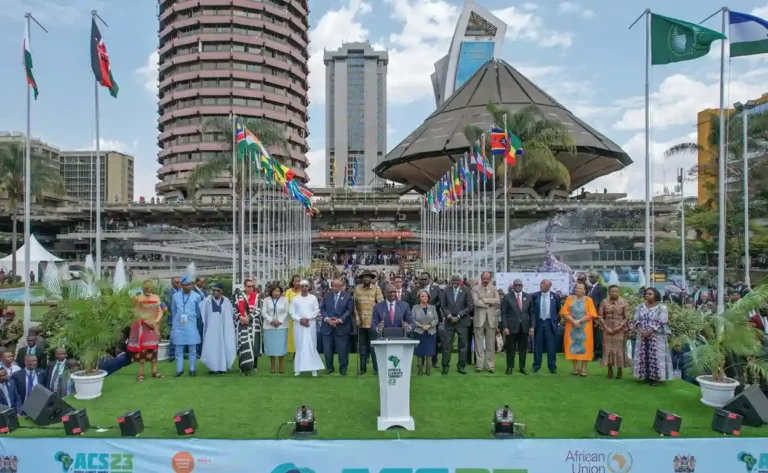African leaders have proposed new global taxes and reforms to international financial institutions to help fund climate change action in a declaration that will form the basis of their negotiating position at November’s COP28 summit.
The Nairobi Declaration capped the three-day Africa Climate Summit in Kenya, which was dominated by discussions of how to mobilize financing to adapt to increasingly extreme weather, conserve natural resources, and develop renewable energy.
“The Nairobi Declaration, our common stand and firm resolution, reaffirms our determination and sets the stage for a new phase in the global climate action and sustainable development agenda, giving the future of socio-economic transformation a distinct and affirmative African character,” said Kenya’s President William Ruto during the closing ceremony of the Africa Climate Summit.
Despite suffering from some of the worst impacts of climate change, Africa only receives about 12% of the nearly $300 billion in annual financing it needs to cope.
The Nairobi Declaration demands that major polluters and global financial institutions commit more resources to help poorer nations and make it easier for them to borrow at affordable rates.
It urges world leaders “to rally behind the proposal for a global carbon taxation regime, including a carbon tax on fossil fuel trade, maritime transport, and aviation, that may also be augmented by a global financial transaction tax”.
African countries will take the proposals in the Nairobi Declaration to a U.N. climate conference later this month and the COP28 summit, which begins in the United Arab Emirates in late November.
The “Nairobi Declaration” is a call to action for the international community to address climate change and economic disparities on the African continent.
Africa Climate Summit Declaration Ceremony, KICC, Nairobi County. https://t.co/1AcPTLHGtw
— William Samoei Ruto, PhD (@WilliamsRuto) September 6, 2023
African leaders are demanding access to the investments necessary to unlock Africa’s potential and translate it into opportunities for its people.
They are calling for global taxes on financial transactions and carbon emissions to fund climate resilience projects, as well as greater economic autonomy and self-sufficiency across the continent.
The declaration highlights the urgent need for equitable solutions to the climate crisis and economic development and emphasizes the continent’s determination to secure a prosperous and sustainable future.
During the summit, governments, the private sector, multilateral banks and philanthropists substantial commitments totalling $23 billion for green growth, mitigation and adaptation efforts across Africa.
For instance, the United Arab Emirates (UAE) pledged USD 450 million towards the purchase of carbon credits from the Africa Carbon Markets Initiative (ACMI).




